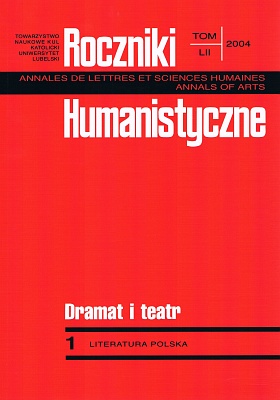Dramat modernistyczny wobec kryzysu antropologicznego przełomu XIX i XX w.
Abstrakt
The subject of the article is the dramaturgy of the turn of the 19th century in the aspect of the changes that occur in understanding what is religious, and more exactly – what is Christian, in it. The article has a general character as we still do not have a sufficient amount of detailed analyses of the works of the writers undertaking religious subjects. It is pointed that in the studied period a basic polarization took place between the `cultural' reference to the Christian roots of the European civilization, and an attempt to penetrate in a `live' way into the truths of the faith contained in Christ's paschal message. The discussed breakthrough determines the crisis of culture and religion that has been noticed by numerous researchers. The changes are studied in the dramaturgy of the Young Poland period (Młoda Polska) with the use of a wide perspective of understanding the anthropological crisis. The fact is pointed to that moral relativism and the contestation of the Christian vision of man and God in the modernistic works had their source in religious modernism that tried to reconcile the Christian Revelation with the conclusions reached by agnosticism and history approached in the positivist way. The Young Poland dramas are characterized by various forms of tragedy in the presented world and characters. They created forms of stage literature that have the features of existential tragedy connected with fatalism of history (Szandlerowski) and destruction of moral values (Kasprowicz), as well as with a loss of personal and historical identity (Wyspiański).
Copyright (c) 2004 Roczniki Humanistyczne

Utwór dostępny jest na licencji Creative Commons Uznanie autorstwa – Użycie niekomercyjne – Bez utworów zależnych 4.0 Międzynarodowe.





